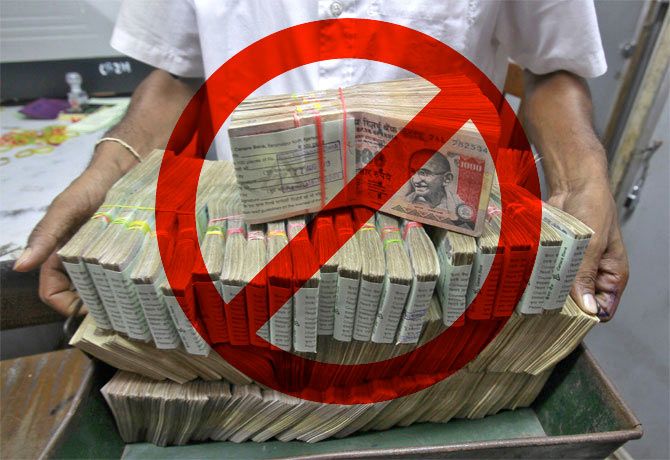 Moody's said implementation challenges, in addition to affecting growth and government revenues, will impact corporates by lowering sales volumes and cash flows.
Moody's said implementation challenges, in addition to affecting growth and government revenues, will impact corporates by lowering sales volumes and cash flows.
Demonetisation will "significantly disrupt economic activity" and lead to weaker growth in the near-term, though in the long run it can boost tax revenues and translate into faster fiscal consolidation, Moody's Investors Service said on Thursday.
In a report titled 'Indian Credit -- Demonetisation Is Beneficial for Indian Government and Banks; Implementation Challenges Will Disrupt Economic Activity', Moody's said the move to ban old Rs 500/1000 notes is affecting all sectors of the economy to various extent, with banks being the key beneficiaries.
"Although the measures in the near term will pressure GDP growth and thereby government revenues, in the longer term they should boost tax revenues and translate into higher government capital expenditure and/or faster fiscal consolidation," Moody's Sovereign Group Associate MD Marie Diron said.
Moody's added that there will be a loss of wealth for individuals and corporates with unreported income, as some will choose not to deposit funds back into the formal financial system to avoid disclosing the sources of these funds.
In the immediate period, demonetisation would "significantly disrupt economic activity, resulting in temporarily weaker consumption and GDP growth," it maintained.
Households and businesses will experience liquidity shortages as cash is taken out of the system, with a daily limit on the amount in old notes that can be exchanged into new notes.
"Corporates will see economic activity decline, with lower sales volumes and cash flows, with those directly exposed to retail sales most affected," Moody's Corporate Finance Group MD Laura Acres said.
However, greater formalisation of economic and financial activity would ultimately help broaden the tax base and expand usage of the financial system, which would be credit positive, it added.
In a report, S&P Global Ratings too said demonetisation would be positive in the long-term, but will have a transitory impact on growth in the short run and could hurt banks' asset quality.
"Bank deposits would benefit due to demonetisation, though not all inflows will remain in the banking system on a permanent basis," S&P said.
On November 8, Prime Minister Narendra Modi announced the demonetisation of 500 and 1,000 rupee notes, thereby withdrawing 86 per cent or Rs 14 lakh crore worth currency from circulation.
Moody's said implementation challenges, in addition to affecting growth and government revenues, will impact corporates by lowering sales volumes and cash flows.
In the medium term, the impact on corporates will depend on how quickly liquidity returns to the system and transaction flows are restored, it added.
The US-based agency said the government could prevent the same amount of cash returning into the system, in an effort to increase the use of non-cash transactions and digital payments.
"This would improve the overall operating environment for doing business in India -- by improving the ease and speed at which payments reach manufacturers and reducing corruption -- but would prolong the economic disruption," it added.
Consumption in India is still largely cash-driven, and a move towards digital payments would require a likely gradual change in consumer habits.
Banks would benefit significantly from a move towards digital payments, given their role as intermediaries for such transactions, Moody's added.
Rising bank deposits -- which Moody's expects to increase by 1-2 per cent as a result of the demonetisation – could lower lending rates, a positive for the banks.
In the nearer term, however, Moody's expects asset quality to deteriorate for banks and non-bank finance companies, as the economic disruption will significantly impact the ability of borrowers to repay loans, in particular for loans against property, commercial vehicles and micro finance sectors.
"A prolonged disruption could also have a more significant impact on asset quality, as both corporate and small- and medium-sized enterprise customers have a limited ability to withstand a sustained period of economic weakness," Moody's added.











 © 2025
© 2025